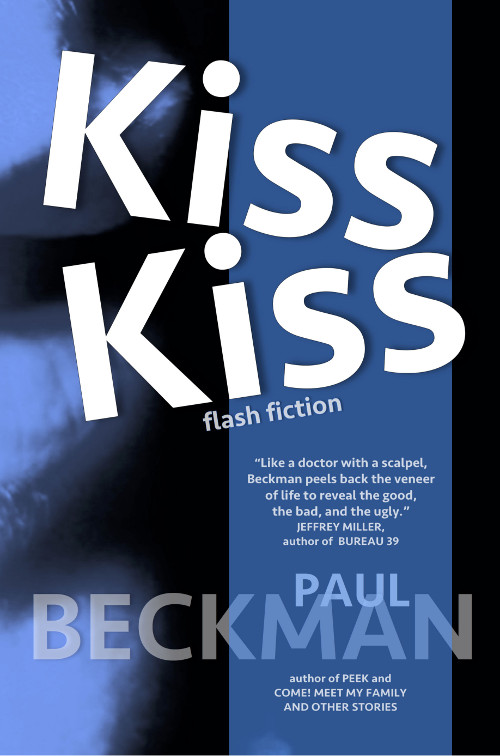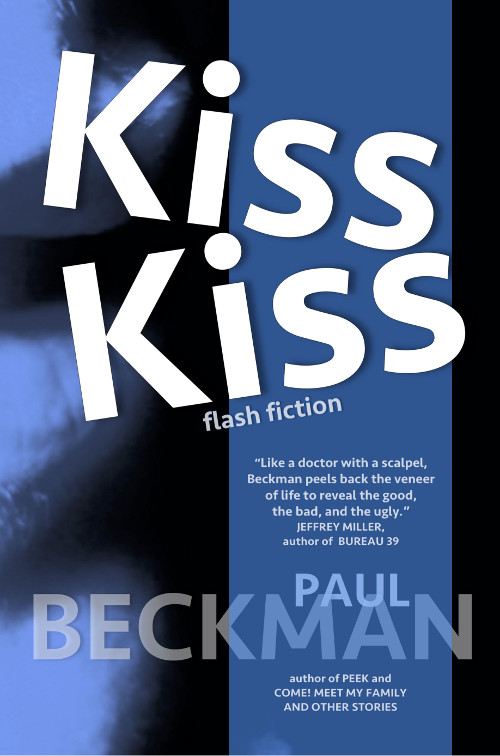
Whenever I read Paul Beckman’s flash fiction, I feel like I’m benefitting from a humorous, avuncular neighbor who is comfortably narrating what are, by turns, realistic and surrealistic tales that highlight both the humor and sadness inherent in the human predicament. The brief, seemingly effortless, stories in Beckman’s newest collection, Kiss Kiss, explore a range of themes from identity and sexuality, to mortality and hard-knocks lives well-lived—all with Beckman’ singularly gifted perspective on the comedy and irony inherent in the quotidian. There is something in his writing—a tone, a manner, an affective atmosphere—that is simultaneously hilarious and melancholy. He writes with a deceptive ease that conceals carefully constructed, always insightful, understandings of a range of characters: a deceased grandmother who once wrote pulp fiction, children who surreally disappear from a public housing project, a dentist who receives eyebrow transplants, and a vacationing middle aged-man who, while staying at a Cuban hotel, finds himself wishing his now absent middle-aged wife would materialize before him exactly as she appeared in her beautiful, long-lost youth. Many of Beckman’s tales are bawdy, often completed with ribald twists. He is unafraid of seeing the ever-present erotic undertones that underlie everyday relationships, and is neither uncomfortable with, nor reluctant to, examine the comic effects these sexual undercurrents produce.
In the collection’s first story, “With a Wink and a Nod,” a late middle-aged narrator tells of the incremental and inexplicable loss of various body parts. First, he spontaneously loses a toe, then an earlobe, then the heel of his left foot. He collects and saves each of these body parts in a canister, but the losses keep coming. He eventually loses the defining appendage of maleness. When his long-estranged wife returns for a visit and a final romp with her diminishing ex-husband, she discovers and absconds with her husband’s manhood. In Beckman’s droll universe these losses are less a cause for alarm than a kind of comic recognition of the inevitable decline and resigned despair of diminishing vitality and identity. In a comic way, the narrator’s losses recall for the reader not just the male loss of virility, but the “Ship of Theseus” problem in philosophy: when does the slow and gradual loss of the essential elements of one’s identity lead to a different identity? Will the gradual loss of one’s capacities and features eventually lead “me” to no longer be “me?”
Beckman is often at his finest when he is at his briefest. In the 120-word story, “Commuter,” we learn of a woman whose loneliness compels her to eschew the advice of her psychiatrist who counsels that she take an alternative subway route so as to avoid being groped. The woman ironically confesses “… there are times a woman needs the touch of another person.” In a similarly brief piece, “Superpowers,” a wife is able to detect through the shared wall of the apartment, the antics of the couple’s next-door neighbors. The husband sarcastically tells his wife that he’s glad she has “superpowers,” but his wife refuses to acknowledge the back-handed compliment—returning instead to her crossword puzzle. “Sorry, did you say something?” the wife asks, feigning deafness. Her husband, undaunted, responds “telepathically,” so that he too, can have his own putative “superpower.” In “Uncle Larry’s Last Magic Trick”—a fifty-word story—the first-person narrator describes a magic-wielding uncle who extracts nickels from the narrator’s nose and quarters from the narrator’s ears. When the father of the narrator enters the room to find the uncle attempting to magically extract a dollar bill by reaching under the skirt of the eleven-year-old female narrator, the title of the piece suddenly becomes painfully meaningful.
Kiss Kiss contains one of Beckman’s many award-winning stories. In the Pushcart-nominated “The Only Hope of the Jews,” an adult narrator recalls the struggles of his earlier, fourteen-year-old, self, when, as a young man, he lived in the housing projects. As the only Jew in a building whose inhabitants are Black, Hispanic and ethnic Caucasian, he finds himself improvising a rock weapon to assail what the narrator describes as his “Jew-hating” neighbors, but does so with the resigned understanding that his efforts will not only prove futile, but make him a disappointment to his mother, who thinks her son has become a hoodlum. He dreams ultimately of escaping the projects and owning a car that will take him far from their menacing environment.
Kiss Kiss encompasses a range of subjects and characters, all of which are rendered with Beckman’s quirky and imaginative descriptive power. The author’s fanciful compass captures the weird, the eccentric, and the whimsical. In one story, while a couple attends a destination wedding, a baby-sitting grandfather, while caring for his ten-year-old charge, wanders off never to be seen again. In another story, a husband who has been married for forty-six years, demonstrates his independence by “moving out” to the backyard. In yet another, a performing magician inadvertently saws a rabbit in half.
Not all of the stories in Kiss Kiss work with same degree of panache. The hundred-or-so word story “Creep” felt to me that it needed one or two additional lines of development so that the reader might more clearly understand why the first person narrator is indeed a creep. Similarly, in “Sis” a story about a mother’s dislike for her daughter, the narrator doesn’t deliver the usually strong and amusing ending that I have come to expect from the author. Despite these minor challenges, Kiss Kiss is a delightful and rewarding reading experience. Paul Beckman has an enviable ability to maximize flash fiction’s capacity to treat the odd, the taboo, the thought-but-unspoken, and the inadvertently hilarious—all in a very brief format. Kiss Kiss is not only a pleasure to read, but an important step forward for the succinct, yet demonstrably powerful, genre of flash fiction.
Kiss Kiss, by Paul Beckman. Adelaide, Australia: Truth Serum Press, March 2018. $15.00, paper.
Brad Rose is the author of a collection of poetry and flash fiction, Pink X-Ray (Big Table Publishing). His two new books of poems, Momentary Turbulence and WordinEdgeWise, are forthcoming from Cervena Barva Press.
Check out HFR’s book catalog, publicity list, submission manager, and buy merch from our Spring store. Follow us on Instagram and YouTube. Disclosure: HFR is an affiliate of Bookshop.org and we will earn a commission if you click through and make a purchase. Sales from Bookshop.org help support independent bookstores and small presses.


Leave a comment